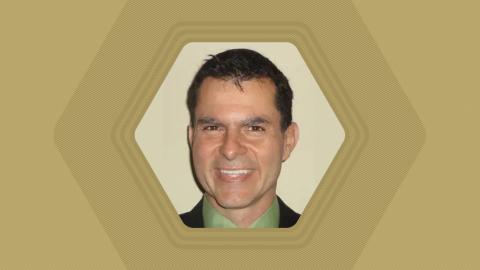The ECE professor won the award for ground-breaking developments to power regulation and energy harvesting technologies, and outstanding contributions to analog microcircuit education.
Georgia Tech School of Electrical and Computer Engineering (ECE) Motorola Solutions Foundation Professor Gabriel A. Rincón-Mora received the 2024 Outstanding Educator Award from the IEEE Atlanta Chapter at the annual banquet on Nov. 8.
The award recognizes a member of the Atlanta community who, through service to IEEE or other professional and technical organizations, has made an outstanding contribution to the electrotechnology profession.
Rincon-Mora, who is also a Fellow of the National Academy of Inventors, the Institute of Electrical and Electronics Engineers, and the Institution of Engineering and Technology, won for ground-breaking developments to power regulation and energy harvesting technologies, and outstanding contributions to analog microcircuit education.
Rincon-Mora has more than 25 years of service at Georgia Tech and the greater Atlanta area. He earned his M.S. in 1994 and Ph.D. in 1996 from Georgia Tech, and was inducted into Georgia Tech's Council of Outstanding Young Engineering Alumni in 2000. He worked for Texas Instruments in 1994–2003, was Adjunct Professor at ECE in 1999–2001, and has been a full-time professor at Georgia Tech since 2001.
He is a recognized authority in the semiconductor industry in power supplies and energy harvesting.
Rincon-Mora pioneered the use of positive feedback loops to accelerate the response of low-dropout regulators and hysteretic control to stabilize and accelerate the response of switching power supplies. He developed and mastered techniques for rejecting and suppressing power-supply noise, allowing cell phones, tablets, and laptops power supplies to be more accurate, occupy less space, and consume less energy.
He also developed ground-breaking switched-inductor microchips that draw power from tiny fuel cells, vibrating piezoelectric transducers, and magnetically coupled coils. He pioneered ways of amplifying the power they draw by investing pre-damping energy into the system. He similarly developed photovoltaic and thermoelectric microchip technologies that draw more power from ambient light and heat and consume less energy. With these innovations, wireless microsystems draw more power from biological and ambient sources, so they can perform more functions across longer periods.
He's taught ECE 3040 Microelectronic Circuits, ECE 3400 Analog Electronics, ECE 4430 Analog Integrated Circuits, ECE 6412 Analog IC Design, and ECE 6445 Power IC Design at Georgia Tech and professional short courses on analog, power, and energy integrated-circuit design for Intel, ON Semiconductor, Dialog Semiconductor, Cypress Semiconductor, Integrated Device Tech., Dolphin Design, RF Micro-Devices, Space & Naval Warfare Syst. Command, Toko Inc., Spyro Tech., and others.
His scholarly output includes 12 books, 8 handbooks, 4 book chapters, 44 patents, over 200 articles, 25 educational videos, and over 26 commercial power-chip products released to production.
Rincón-Mora's current research focuses on the design and development of silicon-based microchips and microsystems that draw and condition power from tiny batteries, fuel cells, magnetically coupled coils, and generators that harness ambient energy from motion, light, temperature, and radiation to supply and sustain mobile, portable, and self-sustaining devices like wireless microsensors for biomedical, consumer, industrial, and military applications.
He’s received a number of other awards for his work.
He’s been recognized with the National Hispanic in Technology Award from the Society of Hispanic Professional Engineers, Charles E. Perry Visionary Award from Florida International University, Three-Year Patent Award from Texas Instruments, Orgullo Hispano Award and Hispanic Heritage Award from Robins Air Force Base, a State of California Commendation Certificate from Lieutenant Governor Cruz M. Bustamante, and the IEEE Service Award, among many others.
